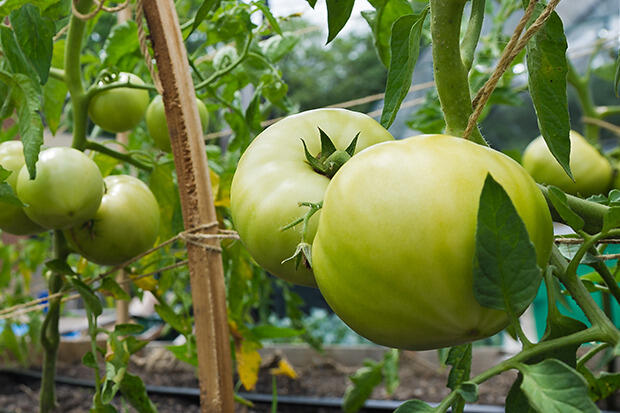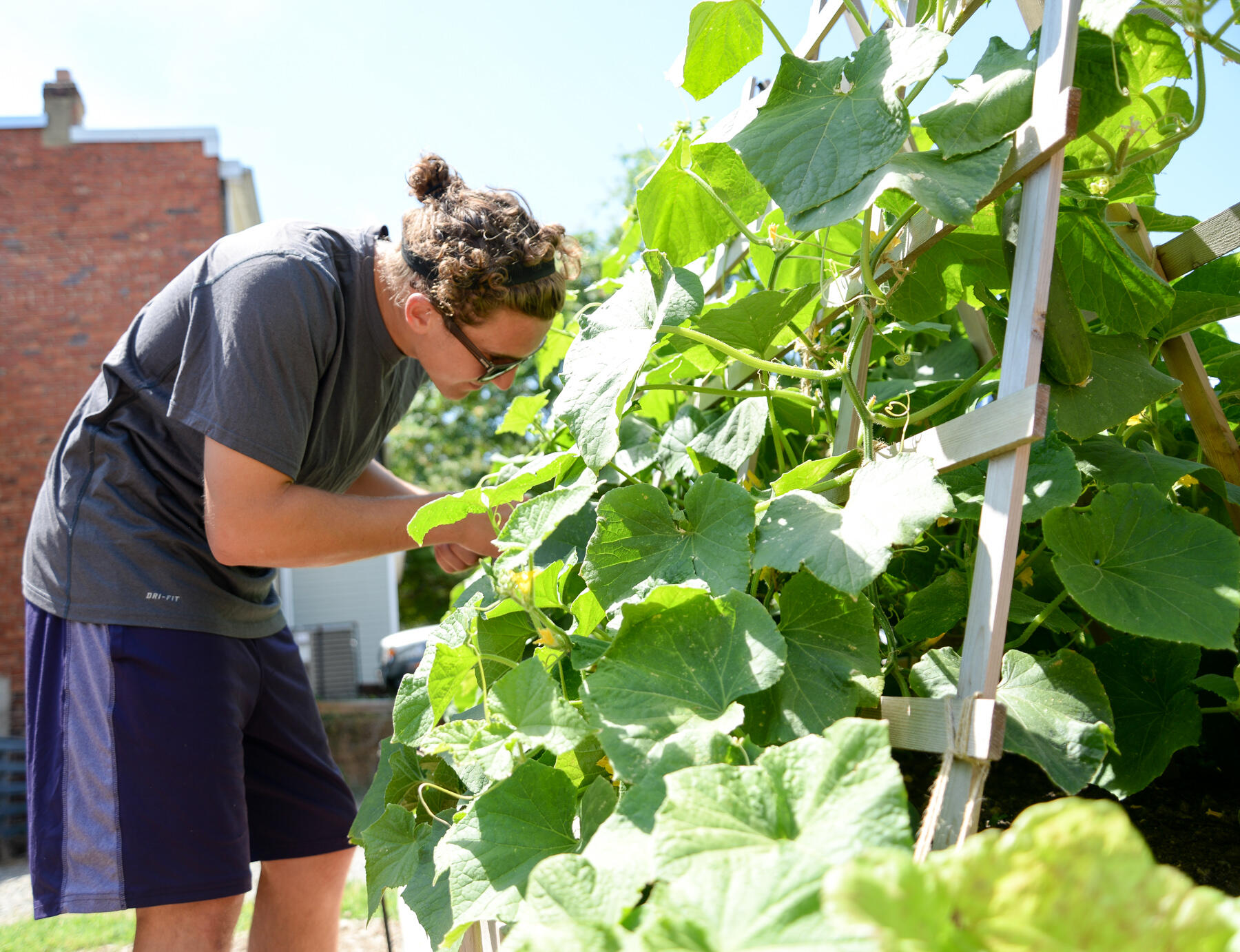
June 30, 2016
Community roots
Share this story
It could have just been a few parking spaces. Instead, a townhouse-sized lot tucked behind the West Cary Street Parking Deck at Virginia Commonwealth University houses a new garden that grows food for students and community members in need.
“Because of its location there are a lot of people walking by, and I get the opportunity to talk to people all the time,” said Hannah Wittwer, learning garden coordinator in the Office of Sustainability and resident farmer-in-chief.
At around 1,500 square feet, the Monroe Park Campus Learning Garden was laid out to maximize productivity and soak up the sun. As July approaches, crops are sprouting from eight wooden raised beds, vertical planters, old whiskey barrels and dozens of large coffee bags.
Produce from the garden goes to RamPantry, a food pantry for VCU students, faculty and staff in need, and the nearby Center for High Blood Pressure, a free clinic serving uninsured Richmond residents. Wittwer said she aims to grow and donate 800 pounds of food this year.
“The garden doesn’t have a fence around it intentionally, so people will feel more welcome to come in and explore,” said Erin Stanforth, director of sustainability.
Growth spurt
| Move the slider in the above image to watch the garden grow from January 2016 to June 2016. |
This lush, green scene was quite different just a year ago. Originally purchased as part of a parking project, the space was gifted to the Office of Sustainability from VCU Parking and Transportation.
“We did a survey in 2014 at our annual flagship event, Campus Sustainability Day, and we asked students from freshmen to seniors if they would be interested in an on-campus learning garden,” Stanforth said. “Overwhelmingly the response was ‘Yes.’ Coupled with RamPantry’s lack of access to fresh produce, we decided to see if we could create a learning garden on the site.”
Sustainability applied for a grant from the Council for Community Engagement and received a stipend for the project last summer. That, combined with office funds, allowed the site to be graded and piped for water, and also allowed for the addition of an accessible parking spot.
Wittwer brought years of agricultural experience to the role when she joined VCU in January. But gardening between a four-story parking deck and a privately owned apartment building presented new tests.
“My background in rural agriculture made it feel more challenging. Rural farms are typically wide open space,” Wittwer said. She reached out to local gardeners at places such as Tricycle Gardens and the Sacred Heart Community Center, finding “an enormous amount of support from local gardeners.”
“It requires a different thought process,” Wittwer said. “What do I need to add back into the soil? How quickly is this going to grow in relation to this? What can I get away with in this tiny space? These are things I have to think about a bit differently now that I’m working with contained, raised beds in an urban environment. That’s been an interesting challenge that I’ve had fun with.”
The raised beds are an innovative characteristic of the garden. They were constructed in late February with guidance from Dinkus Deane, director of operations for the School of the Arts. Shalom Farms, the Richmond-based food access and community development project, donated young plants and started them in their greenhouse. Other plant, seed and material donations came from Snead’s Nursery and Blanchard’s Coffee.
|
Dig into the garden The garden welcomes student, staff, faculty and community volunteers. Find volunteer opportunities at www.signupgenius.com/go/ |
“The crops were planted really thoughtfully. I took a page out of Shalom Farms’ book when thinking about this because they are serving a similar population of people who have not had a lot of opportunity to work with and eat fresh food,” Wittwer said. “What vegetables are going to be the least intimidating, the most familiar and the easiest to work with?”
Other helping hands have come from VCU entities such as the Division of Community Engagement, including its Service-Learning program office; Middle of Broad, a nonprofit design assistance center that is a partnership of three design departments in the School of the Arts; Verde; Green Unity; Facilities Management; and the School of Pharmacy.
“There’s really a lot of partnerships,” Wittwer said. “It’s what’s made it happen as quickly as it has.”
The right prescription
On a warm June afternoon, Melanie Barthlow tugs a cart across Cary Street laden with produce fresh-picked from the garden. She is director of operations for the nonprofit Center for High Blood Pressure, formed in the 1980s to serve low-income and underinsured Richmonders facing hypertension, diabetes and other health issues. The center is the chief community partner of the garden, receiving food picked every other week.
As they unpack the produce, Barthlow and three interns plan which vegetables to work into a healthy demonstration lunch and which will be given directly to patients.
Spencer Marfing, a senior health, physical education and exercise science student in VCU’s Department of Kinesiology and Health Sciences in the College of Humanities and Sciences, is one of those interns. A visit with a patient starts with taking preliminary vitals and gathering other information for doctors.
“In addition to that, we’re trying to just promote healthier lifestyles and eating. That’s how the garden comes into play for us,” Marfing said. “It’s really cool. I’m really amazed at the quantity and the variety that’s over there at the garden.”
“The health care providers can prescribe them to eat, say, four zucchinis over the course of a week. We are able to provide that produce, but [also] teach them how to cook it in a healthy, easy fashion,” Stanforth said.
<slideshow id=139 align=center width=620>
Packing RamPantry’s baskets with healthy produce
A kitchen area tucked in the University Student Commons is a hive of activity on a Wednesday morning, as Wittwer joins staff and student volunteers in making a big delivery to the RamPantry. They unpack box after box of produce from Relay Foods, sorting blueberries, sweet potatoes and other produce.
The Office of Sustainability has taken on an important logistical role with RamPantry. In addition to providing food from the learning garden, the office helps pick up donations from Shalom Farms, Relay Foods and other sources. Sustainability representatives also deliver food remaining at the end of a shift to be made into soup for the homeless provided through Grace and Holy Trinity Episcopal Church.
VCU is a member of the College and University Food Bank Alliance, which counts 320 active campus food banks as of June 1. A 2014 study by the Food Desert Task Force, Virginia Tech and Virginia State University found that 22.8 percent of Richmond residents were food-insecure, and 20.4 percent lived in food deserts — defined as an urban neighborhood that lacks a grocery store within one mile. The study recommended many steps, including more community gardens and urban farming.
Terrence Walker, an advisor to RamPantry and an administrative assistant in University Counseling Services, said many college students do not leave poverty behind when they arrive on campus. The issue, he said, “affects colleges and universities across the country.”
Walker said student response to the RamPantry has validated the need for it and demonstrated the interest students have in the kind of produce the learning garden can provide.
“Students are usually in line as soon as the pantry opens to get access to fruits and vegetables before they run out,” Walker said. “So it’s made it clear that students want to eat healthy, but they have limited access to healthy food options.”
Developing a community resource

Only midway through the first year of operation, the Office of Sustainability has plans to expand the mission of the garden.
That sensation of picking something fresh off the plant and putting it in your mouth is so valuable and empowering.
“Anything we can do to teach individuals what to do with their own limited green space is really, really important to VCU and the Richmond community at large,” Stanforth said. “We’re hoping to give people enough baseline knowledge to inspire them to be creative in their kitchens in a healthy way.”
A partnership with New Clay House, a Virginia Supportive Housing community in Carver for formerly homeless adults, is in development. Wittwer’s team aims to add wheelchair-accessible tabletop garden beds, like those in the MCV Campus Community Garden. They also hope to plan and build a shelter space that can house deeper educational opportunities.
“We really want this garden to be a community resource, a place that community members can go to have an experience with gardening and with fresh food,” Wittwer said. “That sensation of picking something fresh off the plant and putting it in your mouth is so valuable and empowering.”
Subscribe for free to the weekly VCU News email newsletter at http://newsletter.news.vcu.edu/ and receive a selection of stories, videos, photos, news clips and event listings in your inbox every Thursday.
Subscribe to VCU News
Subscribe to VCU News at newsletter.vcu.edu and receive a selection of stories, videos, photos, news clips and event listings in your inbox.










